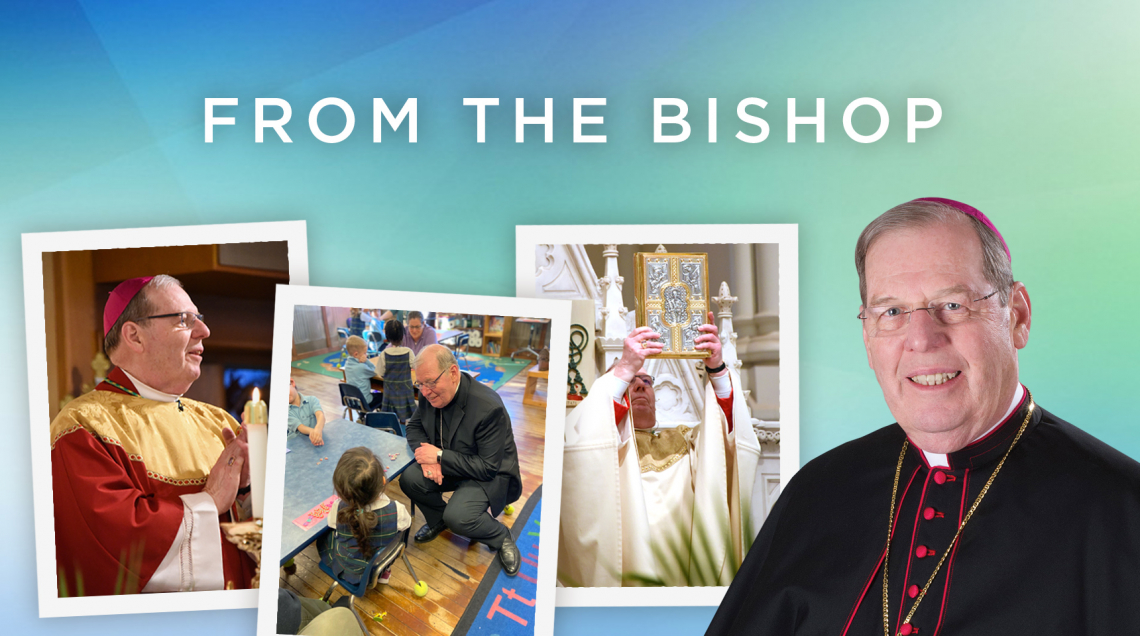From the Bishop - September 2021

Recently, I was happily sharing in a cookout, a gathering for family and friends. As often happens, I was asked to offer a prayer of thanks before the barbecue. As I started the prayer, I was aware that Eamon, my two-and-a-half-year-old grandnephew, was standing right behind me. He wanted to be “nearer the prayer.” I am sure he was ready to help me out if I needed it! I thought to myself, when I learned what he was doing, how grateful I am that we can have these memorable family moments once again. This summer has been very different from a year ago. Now, we are able to travel and have personal visits. Though there are still worries about the direction of COVID-19 and its variants, we have been blessed in what the vaccines have made possible. We are again able to be with each other and enjoy the company of family and friends. That is true, of course, also for our Church family. We are grateful that we are able once again to come together for Mass.
As I give thanks for our situation, and the way we are cautiously moving forward, I have been thinking of the difficulties that others in our world experience. The lives of our international priests who have come to help us in Maine give me an opportunity to personalize those difficulties. Whether it be India or Africa, the situation of the families of our international priests in their home countries is much more challenging than our own. Given all the restrictions on travel, for example, our priests are unable to visit with their families. The telephone and apps are valuable tools for communication, but they do not substitute for the chance to be together. Livestreaming gives families in India or Africa a chance to see their sons and brothers celebrating Mass. That can give some assurance to families, but, like all of us, the men would prefer to make the trip home. The online Masses are a way, however, that they can pray together with their families. Still, it is good to remind ourselves of the sacrifices these men make in order to serve us here in Maine.
Talking with our international priests also underlines the pressing problem present in the issue of the distribution of vaccines around the world. We are blessed in this country to have complete access to these vaccines. In India and the many countries of Africa represented by our priests, that is not the case. Vaccine distribution is very slow in India, Tanzania, Ghana, and Nigeria, countries that have neither the financial resources nor the manufacturing ability to produce them. The percentage of people vaccinated in the poorer parts of our world is woefully inadequate. The variants, therefore, are a much greater threat in these populations. Vaccines are the way forward to bring us out of this pandemic. I am very hopeful that our own government here in the U.S. will continue to cooperate fully with those international agencies that are trying to close the gap in access to these lifesaving vaccines.
The families of most of our international priests live in places where there has been scant availability of vaccines. It is another concern for these men. They naturally worry about their families, many of whom live in remote areas. This can be helpful as it controls the spread of COVID-19, but the lack of infrastructure and good transportation also impede the distribution of the scarce vaccine resources. The situations of these families, close to us because their sons and brothers are with us, remind us that it is important that we work with the helping agencies to provide for these people. Pope Francis has also called for action in this regard: “I urge the entire international community, in a spirit of global responsibility, to commit to overcoming delays in the distribution of vaccines and to facilitate their distribution, especially in the poorest countries.”
Our international priests are also facing challenges with the requirements of immigration here in the U.S. Though we have worked diligently with the help of legal assistance to keep their documents up to date, delays in processing such documents are threatening the possibility of some of these men remaining in our country. At present Fr. Alex Doss, HGN, in St. Agatha is unable to work as the parochial vicar because we could not get an extension on his work permission due to bureaucratic delays caused by the pandemic. We will be confronting more serious problems after the new year with documentation for some other international priests. The Diocese of Burlington recently announced the temporary closing of five parishes due to these same issues with immigration. In fact, dioceses across our country are experiencing similar problems with immigration requirements. It is one more challenge we give to those international priests who come to us to help us to serve the vast territory of our state. It gives us further reason to be grateful for their generosity and thankful for their ministry among us. May the Lord bless them for their service to the people of Maine, and for the sacrifices they make to carry it out.
God bless you,
Bishop Robert Deeley










